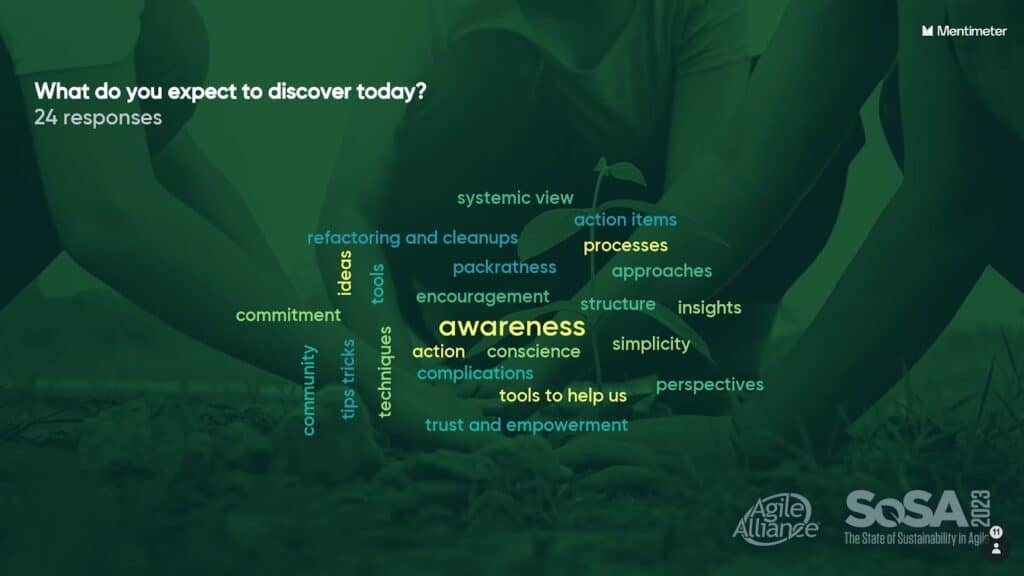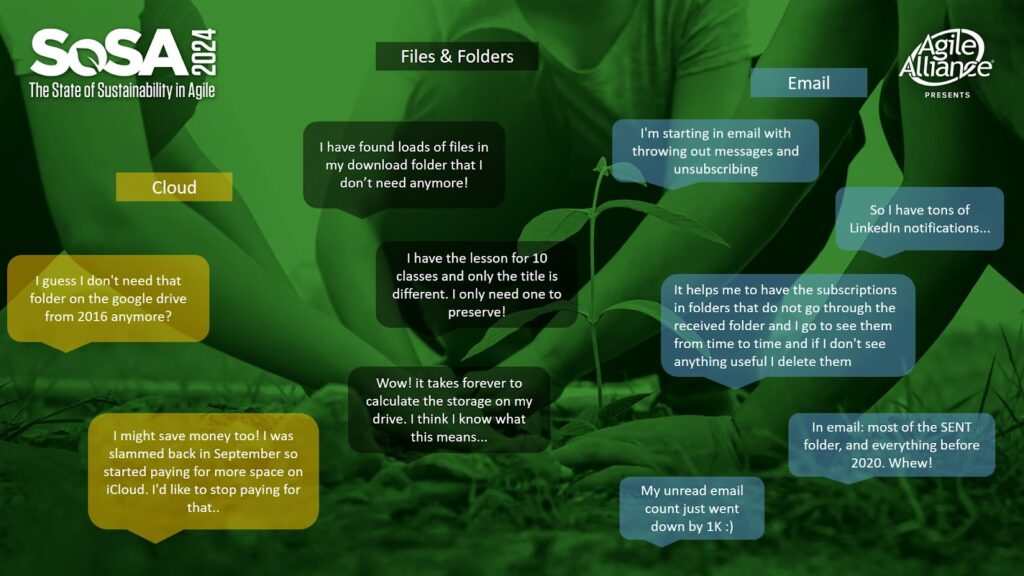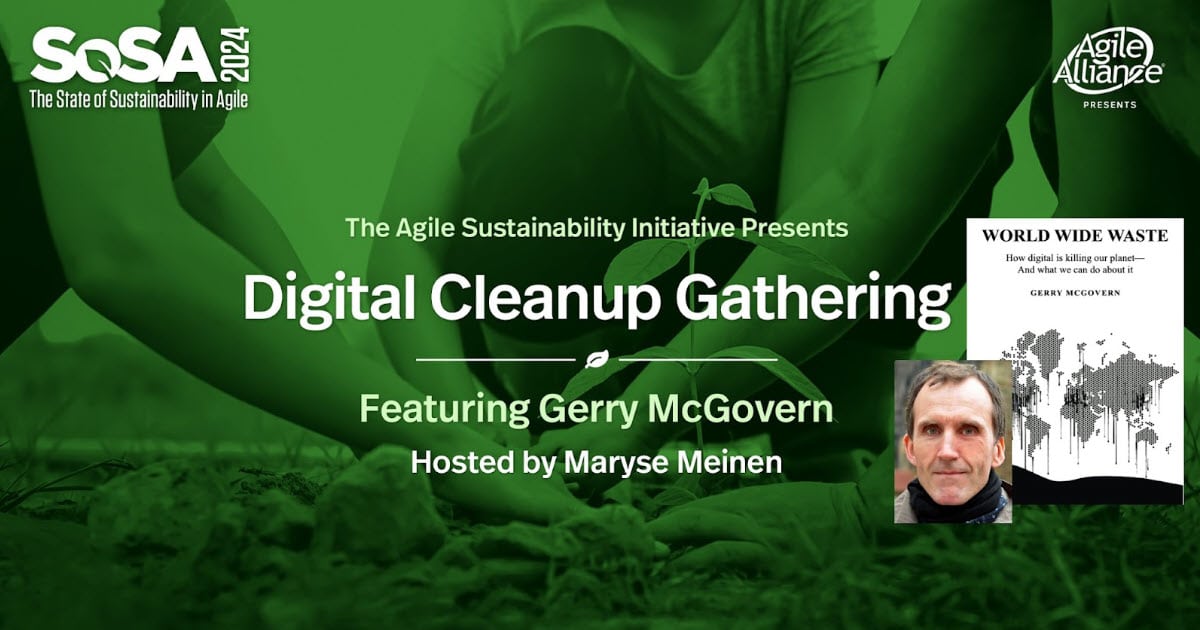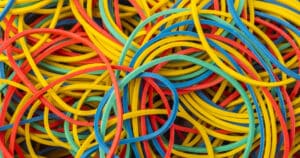The Agile Sustainability Initiative, aiming continuously to improve the State of Sustainability in Agile (SoSA), invited participants to a Digital Cleanup Gathering on March 15. This was in support of the Digital Cleanup Day with the idea of digging through our digital cupboards and starting spring cleaning in the style of the World Cleanup Day, where people have fun with friends and neighbors while cleaning up the neighborhood.
We started by understanding what participants expected to discover during the gathering. Many mentioned they were mainly looking forward to learning about tools and approaches, as well as getting some tips and tricks.

But as awareness was emphasized most, we were lucky to have Gerry McGovern (author of the most recommended book, “World Wide Waste”) presenting a keynote about the waste we all create and leave behind on the web. He pointed out that, for example, 91% of content gets no traffic from Google, that 95% of apps are unused after 90 days, and that 81% of data is duplicative, redundant, or “dark data,” in other words, it is completely unclear what it is about.
In summary, a lot of data on the internet is – sorry to say – just crap.
Now, we were all ready to roll up our sleeves and eliminate our digital waste. Maryse Meinen did a wonderful job guiding us in our hunt for old emails, files, documents, pictures, and videos, as well as suggestions for unsubscribing from newsletters and much more.
We used the hints from the Digital Cleanup Day and started by cleaning up our computers and drives. Next, we cleaned up our emails and looked for digital waste on our phones.
How you can do this too!
Below are some suggestions on how you can do this on your own.
Computers & Drives: Anything stored on your computer consumes memory and power, hence produces CO2. Deleting data from your computer is the key to extending that device’s lifespan. The more space you conserve on your computer, the less it will slow down, and the more you can make the software and operating system updates required to function properly.
The manufacturing of hardware accounts for a significant portion of the carbon footprint associated with electronic devices. Research indicates that manufacturing contributes to approximately 74% of total emissions. Therefore, it is vital to find mechanisms to care for your equipment to extend its life. Here are some suggestions:
- Measure your impact: First, measure the storage that you’re using right now. A good idea is to create a “DigitalCleanup” folder to which you move everything you want to delete.
- Take action: Clean up temporary files. Organize your files to make it clear what’s needed. Sorting photos, videos, and audio.
- Measure what ended up in the DigitalCleanup folder, delete it, and celebrate your achievement!
Emails: 334 billion emails were sent every day during 2022. One email emits, on average, 0.3 g of CO2. Emails could account for as much as 150 M tons of CO2, which is about 0.3% of the world’s entire carbon footprint. On that basis, average email usage is equivalent to driving a small petrol car for around 206 kilometers.
- Measure your impact: Understand how much space is used by your emails
- Take action:
- Cleaning your emails: Use filters to sort your emails: By date, size, sender name, or subject (i.e., you want to discover the ones showing “FYI,” “noreply,” “newsletter,” or those containing only “OK,” or “Thank you.” Delete the filtered emails. Empty the recycling bin.
- Establish good practices: Unsubscribe from stuff you don’t want. Limit the number and weight of attachments. Limit the number of receivers and the size of your signature.
- Re-measure the amount of space used, and don’t forget to celebrate!
Smartphones and tablets: The applications that you don’t use anymore still consume memory, power, and bandwidth. It is advised to keep at least 1 GB of free space to ensure the proper functioning of your system.
- Measure the current size of the data stored on your smartphone.
- Take action: Delete applications you don’t use anymore. Empty the cache. Delete files like pictures (especially the duplicated and/or blurred ones), videos, or downloads. Delete messages, and in particular, spam messages, sponsored messages, the “OK,” “I’m home,” or “Happy New Year 2000” messages.
- Re-measure your data storage and celebrate your gain!
It seemed most of us were surprised about the waste found and the difference that could be made. Here are some comments from participants:

One closing remark in particular seemed especially appropriate: “Things work better without all the waste and junk I keep. So freeing.”
So, what are you waiting for? Set yourself free and start with your digital spring cleaning!












